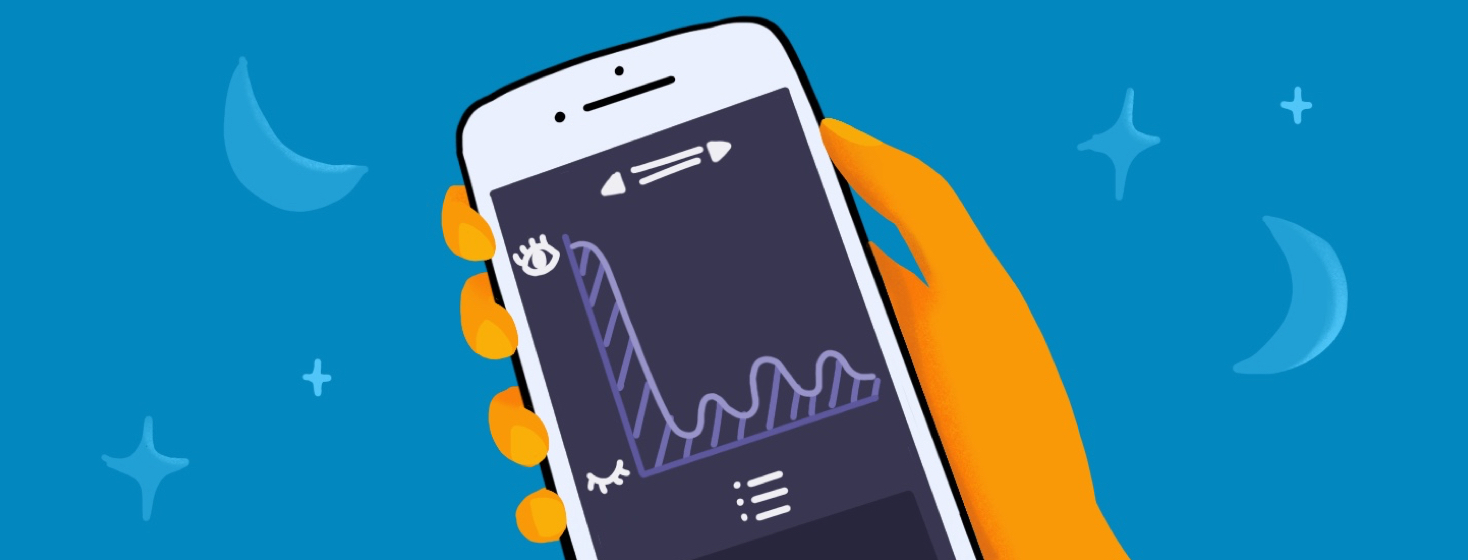10 Popular Insomnia Apps
We live in a modern world and with a modern world comes technology. Using devices is often touted as a no-no when it comes to good sleep hygiene. We’re told to avoid screens for an hour or two before bed - no phone, television, computer, etc - because the blue light they emit can disrupt melatonin production, which is the hormone related to sleeping. This is excellent advice.
I have an exception though. Insomnia apps.
3 types of apps for insomnia
Apps seem to fall into 3 categories: recording sleep, tracking sleep, and assisting with sleep.
Recording sleep
Recording sleep is done with a sleep diary. Sleep and wake times are recorded, as well as perceived quality of sleep. This data is then translated into summaries and graphs. Over a period of time sleeping patterns emerge and sharing this information can be useful when consulting medical professionals about insomnia.
Tracking sleep
Sleep tracking uses your smartphone’s microphone and motion sensors to measure your sleep during the night. Most commonly the smartphone is placed nearby and sensors listen to breathing and record body movements related to the sleep phase. In general, more movement means lighter sleep. You can also track sleep with a wearable device linked to your smartphone. This is called actigraphy. Sleep tracking apps and devices are not recommended for restless legs syndrome.1
Assisting with sleep
Mindfulness, meditation, and hypnosis apps can all assist with sleep by slowing the breath, relaxing muscles, and calming racing thoughts. Studies have shown mindfulness and meditation can improve insomnia. But even if these apps don’t put you to sleep, they may relax you enough to rest your body for a short while.2
Binaural beats is a soundwave therapy some people prefer over traditional meditations. There are thousands of apps to assist sleep and what works for one person won’t work for another. When listening to anything with a voice-over, I’ve learned it’s only helpful if you enjoy the narrator’s voice. It’s a matter of experimenting and finding something that soothes and calms you.3
It’s important to note that best sleep practice includes not checking the phone during the night. So once the app is done, and you’ve hopefully had some sleep, don’t check the phone. Watching the clock can disrupt sleep.
10 popular insomnia apps
1. Sleep-Diary
Available on IOS and Android, is a simple diary to record sleep data with eight daily questions. Data is put into a graph so over time you can monitor the amount of sleep you get.
2. SleepScore
SleepScore tracks breathing and movement, providing an in-depth analysis of your sleep. The free version tracks sleep has a smart alarm and records 7 nights of data. There is a premium upgrade with additional features for $59.99 per year.
3. Sleep Cycle
Sleep Cycle uses sound analysis and movement tracking to identify different sleep states. You set an alarm and Sleep Cycle monitors signals to gently wake you in the lightest possible sleep stage. The free version tracks and analyses sleep and includes intelligent wakeup. The premium version has additional features for $39.99 per year.
4. Calm
Calm is my favourite sleep app. It’s beautifully laid out with loads of meditation options. The sound of Stephen Fry narrating lullabies has seen me through some very stressful moments. The free version has a decent library while the premium version includes hundreds - if not thousands - of meditations for $59.99 per year.
5. Headspace
Headspace is one of the most well-known mindfulness and meditation apps, created by former monk, Andy Puddicombe. The app has guided meditations, animations, articles and videos. There are numerous categories including basic meditation, anxiety and of course sleep. The free version has a basic selection of meditations. Subscription is $69.99 per year and includes a vast selection of meditations, supportive information and communities.
6. Soultime
Soultime is a Christian meditation app for stress, anxiety, sleep and so much more. It offers mindfulness through prayer. There are over 200 guided mediations and over 80 readings and sleep stories as well as music for relaxation. The free version has quite a few options and full access is a $59.99 annual subscription.
7. Hypnobox
Hypnobox brings about a state of physical and mental relaxation. You can choose from different audio tracks or narrators. The sessions are around 30 minutes long and cover numerous topics including self-worth, weight loss, and sleep. The Free Box includes nine suggestions (to create tailor-made hypnosis) and four complete sessions, while the pro version, with over 600 suggestion modules, is $71.99 per year.
8. Pzizz
Pzizz uses psychoacoustic principles to improve quality of sleep. The website states there are over 100 billion remixed sounds to optimise all sleep stages. There are narration and music options to accompany the guided meditation. It starts with an automatic 7-day free trial then you can continue with the basics or subscribe for $69.00 per year.
9. White Noise Lite
White Noise Lite has 40 standard definition sounds such as running water, a crackling fire, or a cat purring. There are 5 alarm options and the ability to mix or record your own sound. The pro version has additional features and is ad-free. It can be purchased on the app store for $4.49.
10. Atmosphere: Binaural Beats
Atmosphere: Binaural Beats has a range of built-in binaural beats (a pulsing sound of varying frequencies). According to the website you can generate your own frequencies, however, I’ve been unable to find this option. The beats can be paired with background music, white noise, or a focused breathing exercise. The app is best used with headphones and is a great relaxation option for anyone easily distracted by voices.
Have you tried any of these apps? Do you have any favorites that help you fall asleep or improve the quality of your sleep? Share with us in the comments below or in our forums!

Join the conversation